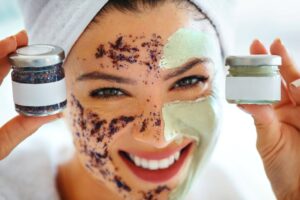Are Skin Masks Really Effective?

Skin masks are regularly available for at home use, and have been used by dermatologists for even longer. But, do they work? We’re going to share with you the pros and cons of skin masks, which ingredients to use for varying concerns, and how employing a dermatologist is a more effective way of achieving the results you desire.
What is a skin mask?
A skin mask is a substance applied to your face as a one piece, plastic sheet or with an applicator so that the ingredients can have longer contact with your skin. The mask creates a film on the skin that either hydrates, moisturizes, dries, or exfoliates the skin depending on the ingredients desired purpose. You may wear the skin mask anywhere from 10 minutes to overnight.
Pros
Millions of Americans are plagued by skin conditions and skin masks offer an intense skin care treatment that may be a more affordable way to treat your skin conditions. There are different skin masks for different skin conditions and because of the longer exposure of the ingredients to the skin than wipe-on-wipe-off treatments offer more beneficial results.
Overnight masks contain a hyaluronic acid that aims to hydrate the skin and are ideal for mature or extremely dry skin.
Clay, sulfur, and mud masks are designed to soak up excessive oils on the skin and also have an exfoliating effect.
Sheet masks contain antioxidants that aim to hydrate and have the additional effect of being anti-inflammatory if kept refrigerated.
Skin masks may also be designed to with specific ingredients to address specific skin conditions:
Acne: salicylic acid and alpha-hydroxy acid are used to treat acne
Fine lines and wrinkles: antioxidants, ferrulic acid, reinoids, and humectants
Redness: niacinamide
Dark spots and pigmentation: kojic acid, retinoids, and vitamin C.
Cons
Skin masks can be very beneficial to treat skin conditions, but there are also side-effects that you will want to consider before using a skin mask to treat your skin condition.
- Don’t try to treat all your conditions at once. The more ingredients that make up your face mask, the more likely the skin mask will end up irritating your skin.
- Applying the skin mask without proper preparation. Each skin mask will have specific instructions of how to prepare your skin before applying the mask. These directions need to be followed carefully to avoid irritation of the skin or not having the desired results.
- Skin masks as a fix-all. Routine skin care is more important than the use of a skin mask. Skin masks should only be used once a week to prevent irritation or creating new skin conditions.
If you are not sure about a skin mask ask your dermatologist or another health-care provider.
Your Dermatologist
Many people seek out skin masks as a cheaper option than employing a dermatologist, when in fact, working with a dermatologist will be less harmful to your skin and cheaper in the long run. A dermatologist will help design a comprehensive skin care solution for the overall health of your skin. They will also be in a better position to monitor the health of your skin to see if the plan needs to be altered in any way.
